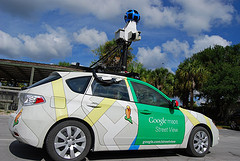FCC Report Says Google Knew It Was Collecting Data With Street View Cars
Google is all about showing the report the Federal Communications Commission wrote up detailing its probe into the company’s Street View cars collecting data from Wi-Fi networks. Which is great, but it seems its claim that it had no clue info was being gathered is kind of suspect.
ComputerWorld cites the report, which has plenty of redacted parts, showing that Google had an engineer who intentionally wrote code to glean the personal data, told other people what he was up to and handed out a document to the Street View crew showing his work of logging payload data. Yet Google has said in the past it had no clue this was happening.
The engineer has not been identified and invoked his Fifth Amendment right when talking to the FCC.
According to the FCC’s report:
As early as 2007 and 2008, therefore, Street View team members had wide access to Engineers Doe’s Wi-Fi data collection design document and code, which revealed his plan to collect payload data. One Google engineer reviewed the code line by line to remove syntax errors and bugs, and another modified the code. Five engineers pushed the code into Street View cars, and another drafted code to extract information from the Wi-Fi data those cars were collecting. Engineer Doe specifically told two engineers working on the project, including a senior manager, about collecting payload data. Nevertheless, managers of the Street View project and other Google employees who worked on Street View have uniformly asserted in declarations and interviews, that they did not learn the Street View cars were collecting payload data until April or May 2010.
Google says it didn’t give permission for any payload data gathering. Which makes it okay? Not buying it.
The FCC recently fined Google an entire $25,000 (basically a drop in the bucket if the bucket holds an ocean, in Google’s case) for impeding its investigation.
Google posts FCC report about Street View [Computer World]
Want more consumer news? Visit our parent organization, Consumer Reports, for the latest on scams, recalls, and other consumer issues.


